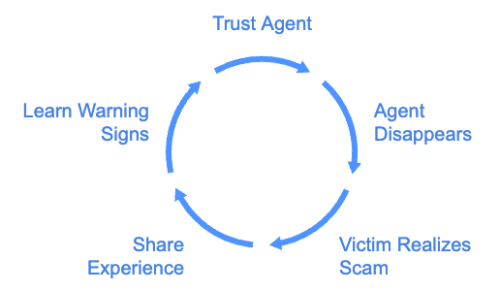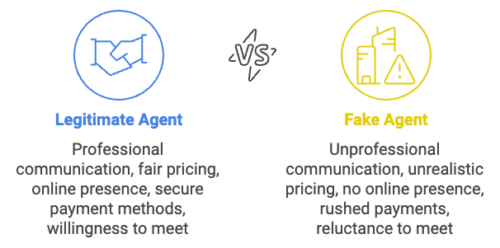
How to Protect Your Social Security Number During the Application Process
December 12, 2022
Illegal Rent Agreements: How to Recognize and Avoid Them
January 17, 2023Can you imagine thinking you trust your real estate agent, only to find out he’s a fraud? Picture this: you’re excited about finding the perfect home. The agent seems professional, communicates well, and even sends you impressive photos and videos of the property. You feel secure as you’re about to make a deposit. But then, the truth hits—you’ve been scammed. The agent disappears, the listing vanishes, and your hard-earned money is gone.
Some of our readers have shared similar stories. They were tricked by fake agents who looked and sounded real. These scammers knew exactly how to play the part, complete with legitimate-looking licenses and company names. They advertised properties that didn’t exist or were never available, leaving victims with empty wallets and shattered trust.
These scams are becoming more common, but there are ways to avoid them. By understanding how fake agents operate and learning to spot the warning signs, you can protect yourself from falling into their traps.

Common Tactics Used by Fake Real Estate Agents
- Fake Property Listings:
- Scammers create convincing property listings that look real. These listings often use stolen photos from legitimate real estate websites and advertise properties at attractive prices to lure in potential renters or buyers.
- They typically use popular platforms and social media sites to reach a wide audience quickly.
- High-Pressure Tactics:
- The scammer insists that you need to act fast because the property is in high demand. This tactic is designed to pressure you into making hasty decisions and paying deposits or fees without proper checks.
- They might tell you that multiple people are interested and that securing the property requires an immediate payment.
- No In-Person Interaction:
- The scammer often makes excuses for why they can’t meet in person. Common reasons include being out of the country or handling a family emergency.
- They might offer virtual tours or send videos of the property instead, using technology to create the illusion of legitimacy.
- Fake Credentials and Company Names:
- Scammers may pose as agents from well-known real estate companies or create fake companies with realistic-sounding names.
- They often use fake or doctored licenses and provide references that are part of their network of fake personas.
- Untraceable Payments:
- Fake agents often request deposits or fees through untraceable payment methods like wire transfers, prepaid debit cards, or payment apps. These methods make it difficult for victims to recover their money after realizing they’ve been scammed.
Signs of a Fake Real Estate Agent
Knowing what to look for can help you spot a scam before it’s too late. Here are some red flags:

- Unprofessional Communication: Poorly written emails, generic greetings, and refusal to answer detailed questions about the property or contract terms.
- Too Good to Be True Prices: If the property is listed at a significantly lower price than other similar ones in the area, it could be a scam.
- Missing Online Presence: Legitimate real estate agents have verifiable online presences. If the agent you’re dealing with has no reviews, no history, or no social media presence, be cautious.
- Rushed Payments: A demand for immediate payment to “hold” the property, especially via untraceable methods, is a major warning sign.
- Reluctance to Meet: If the agent refuses in-person meetings or video calls and only communicates through email or messaging apps, consider it a red flag.
How to Verify a Real Estate Agent’s Legitimacy
- Check Their License:
- Most real estate agents are required to be licensed by a state regulatory body. Verify their license number through your state’s real estate commission or relevant authority.
- Research the Agent’s Background:
- Look up their name online to check for reviews, ratings, and a professional online presence. Legitimate agents are often listed on real estate company websites and industry platforms like Zillow or Realtor.com.
- Contact the Real Estate Company Directly:
- If the agent claims to work for a well-known company, call the company directly using their official contact information to confirm their employment.
- Avoid Untraceable Payments:
- Pay only through secure, traceable methods like checks, bank transfers, or secure payment systems. Never use cash apps, wire transfers, or prepaid cards for initial deposits or fees.
- Request to View the Property:
- Make sure you can view the property in person or, at the very least, through a secure video call where you can confirm the identity of the agent.
What to Do If You Encounter a Fake Real Estate Agent
If you realize you’ve been in contact with a scammer or suspect that an agent is fraudulent, act quickly:
- Cut Off Contact: Stop communicating with the suspected scammer.
- Report the Incident:
- Report the scam to local authorities and consumer protection agencies.
- Use platforms like Section 8 Shield’s Report a Scam Tool to warn others and add to the scam awareness network.
- Notify Your Bank: If you’ve made any payment, let your bank or credit card provider know as soon as possible. They might be able to reverse the charges.
- Spread the Word: Share your experience on consumer protection platforms like the FTC and BBB ScamTracker to help others avoid the same situation.
Conclusion
Scammers posing as real estate agents can seem convincing, but knowing their tactics and how to verify their legitimacy can protect you from financial loss. Always be cautious, do your research, and don’t rush into payments or agreements. By taking these steps, you can stay one step ahead of scammers and keep your rental or buying experience secure.




